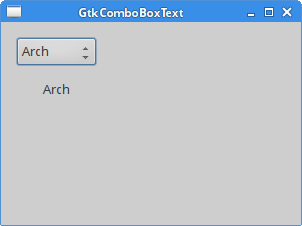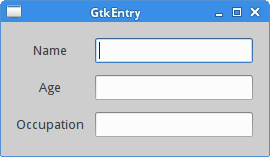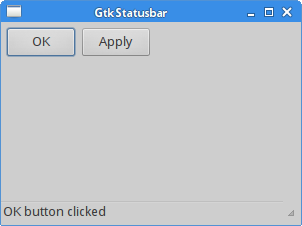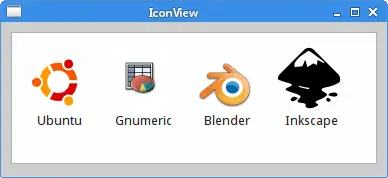GTK+ Widgets II
last modified October 18, 2023
In this part of the GTK+ programming tutorial, we continue covering various GTK+ widgets.
GktComboBoxText
GktComboBoxText is a widget that allows the user to choose
from a list of options. The options are strings.
#include <gtk/gtk.h>
void combo_selected(GtkWidget *widget, gpointer window) {
gchar *text = gtk_combo_box_get_active_text(GTK_COMBO_BOX(widget));
gtk_label_set_text(GTK_LABEL(window), text);
g_free(text);
}
int main(int argc, char *argv[]) {
GtkWidget *window;
GtkWidget *hbox;
GtkWidget *vbox;
GtkWidget *combo;
GtkWidget *label;
gtk_init(&argc, &argv);
window = gtk_window_new(GTK_WINDOW_TOPLEVEL);
gtk_window_set_title(GTK_WINDOW(window), "GtkComboBox");
gtk_window_set_position(GTK_WINDOW(window), GTK_WIN_POS_CENTER);
gtk_container_set_border_width(GTK_CONTAINER(window), 15);
gtk_window_set_default_size(GTK_WINDOW(window), 300, 200);
hbox = gtk_hbox_new(FALSE, 0);
vbox = gtk_vbox_new(FALSE, 15);
combo = gtk_combo_box_new_text();
gtk_combo_box_append_text(GTK_COMBO_BOX(combo), "Ubuntu");
gtk_combo_box_append_text(GTK_COMBO_BOX(combo), "Arch");
gtk_combo_box_append_text(GTK_COMBO_BOX(combo), "Fedora");
gtk_combo_box_append_text(GTK_COMBO_BOX(combo), "Mint");
gtk_combo_box_append_text(GTK_COMBO_BOX(combo), "Gentoo");
gtk_combo_box_append_text(GTK_COMBO_BOX(combo), "Debian");
gtk_box_pack_start(GTK_BOX(vbox), combo, FALSE, FALSE, 0);
label = gtk_label_new("...");
gtk_box_pack_start(GTK_BOX(vbox), label, FALSE, FALSE, 0);
gtk_box_pack_start(GTK_BOX(hbox), vbox, FALSE, FALSE, 0);
gtk_container_add(GTK_CONTAINER(window), hbox);
g_signal_connect(G_OBJECT(window), "destroy",
G_CALLBACK(gtk_main_quit), NULL);
g_signal_connect(G_OBJECT(combo), "changed",
G_CALLBACK(combo_selected), (gpointer) label);
gtk_widget_show_all(window);
gtk_main();
return 0;
}
The example shows a combo box and a label. The combo box has a list of six options. These are the names of Linux distros. The label widget shows the selected option from the combo box.
combo = gtk_combo_box_text_new();
The gtk_combo_box_text_new function creates a simple text-only
combo box.
gtk_combo_box_append_text(GTK_COMBO_BOX(combo), "Ubuntu");
The gtk_combo_box_text_append_text function appends a string
to the list of strings stored in the combo box.
label = gtk_label_new("-");
A new label widget is created.
gchar *text = gtk_combo_box_get_active_text(GTK_COMBO_BOX(widget)); gtk_label_set_text(GTK_LABEL(window), text); g_free(text);
We get the selected text and set the label text to it.
The gtk_combo_box_get_active_text function returns the
currently active string in the combo box. We set the string to the label with
the gtk_label_set_text function.

GtkHSeparator
The GtkHSeparator is a horizontal separator.
It is a kind of an ornament widget. There is also a sister
GtkVSeparator widget.
#include <gtk/gtk.h>
int main(int argc, char *argv[]) {
GtkWidget *window;
GtkWidget *label1;
GtkWidget *label2;
GtkWidget *hseparator;
GtkWidget *vbox;
gtk_init(&argc, &argv);
window = gtk_window_new(GTK_WINDOW_TOPLEVEL);
gtk_window_set_position(GTK_WINDOW(window), GTK_WIN_POS_CENTER);
gtk_window_set_title(GTK_WINDOW(window), "GtkHSeparator");
gtk_window_set_resizable(GTK_WINDOW(window), FALSE);
gtk_container_set_border_width(GTK_CONTAINER(window), 10);
label1 = gtk_label_new("Zinc is a moderately reactive, blue gray metal \
that tarnishes in moist air and burns in air with a bright bluish-green flame,\
giving off fumes of zinc oxide. It reacts with acids, alkalis and other non-metals.\
If not completely pure, zinc reacts with dilute acids to release hydrogen.");
gtk_label_set_line_wrap(GTK_LABEL(label1), TRUE);
label2 = gtk_label_new("Copper is an essential trace nutrient to all high \
plants and animals. In animals, including humans, it is found primarily in \
the bloodstream, as a co-factor in various enzymes, and in copper-based pigments. \
However, in sufficient amounts, copper can be poisonous and even fatal to organisms.");
gtk_label_set_line_wrap(GTK_LABEL(label2), TRUE);
vbox = gtk_vbox_new(FALSE, 10);
gtk_container_add(GTK_CONTAINER(window), vbox);
hseparator = gtk_hseparator_new();
gtk_box_pack_start(GTK_BOX(vbox), label1, FALSE, TRUE, 0);
gtk_box_pack_start(GTK_BOX(vbox), hseparator, FALSE, TRUE, 10);
gtk_box_pack_start(GTK_BOX(vbox), label2, FALSE, TRUE, 0);
g_signal_connect_swapped(G_OBJECT(window), "destroy",
G_CALLBACK(gtk_main_quit), G_OBJECT(window));
gtk_widget_show_all(window);
gtk_main();
return 0;
}
The code example shows definitions of two chemical elements; they are separated by a horizontal separator. This makes the example more visually appealing.
label1 = gtk_label_new("Zinc is a moderately reactive, blue gray metal \
that tarnishes in moist air and burns in air with a bright bluish-green flame,\
giving off fumes of zinc oxide. It reacts with acids, alkalis and other non-metals.\
If not completely pure, zinc reacts with dilute acids to release hydrogen.");
We create the first label, the definition of the Zinc element.
gtk_label_set_line_wrap(GTK_LABEL(label2), TRUE);
The gtk_label_set_line_wrap function break lines if text exceeds
the widget's size.
hseparator = gtk_hseparator_new();
The gtk_hseparator_new creates a new GtkHSeparator.
gtk_box_pack_start(GTK_BOX(vbox), label1, FALSE, TRUE, 0); gtk_box_pack_start(GTK_BOX(vbox), hseparator, FALSE, TRUE, 10); gtk_box_pack_start(GTK_BOX(vbox), label2, FALSE, TRUE, 0);
We place the separator between the labels.

GtkEntry
GtkEntry is a single line text entry field.
This widget is used to enter textual data.
#include <gtk/gtk.h>
int main(int argc, char *argv[]) {
GtkWidget *window;
GtkWidget *table;
GtkWidget *label1;
GtkWidget *label2;
GtkWidget *label3;
GtkWidget *entry1;
GtkWidget *entry2;
GtkWidget *entry3;
gtk_init(&argc, &argv);
window = gtk_window_new(GTK_WINDOW_TOPLEVEL);
gtk_window_set_position(GTK_WINDOW(window), GTK_WIN_POS_CENTER);
gtk_window_set_title(GTK_WINDOW(window), "GtkEntry");
gtk_container_set_border_width(GTK_CONTAINER(window), 10);
table = gtk_table_new(3, 2, FALSE);
gtk_container_add(GTK_CONTAINER(window), table);
label1 = gtk_label_new("Name");
label2 = gtk_label_new("Age");
label3 = gtk_label_new("Occupation");
gtk_table_attach(GTK_TABLE(table), label1, 0, 1, 0, 1,
GTK_FILL | GTK_SHRINK, GTK_FILL | GTK_SHRINK, 5, 5);
gtk_table_attach(GTK_TABLE(table), label2, 0, 1, 1, 2,
GTK_FILL | GTK_SHRINK, GTK_FILL | GTK_SHRINK, 5, 5);
gtk_table_attach(GTK_TABLE(table), label3, 0, 1, 2, 3,
GTK_FILL | GTK_SHRINK, GTK_FILL | GTK_SHRINK, 5, 5);
entry1 = gtk_entry_new();
entry2 = gtk_entry_new();
entry3 = gtk_entry_new();
gtk_table_attach(GTK_TABLE(table), entry1, 1, 2, 0, 1,
GTK_FILL | GTK_SHRINK, GTK_FILL | GTK_SHRINK, 5, 5);
gtk_table_attach(GTK_TABLE(table), entry2, 1, 2, 1, 2,
GTK_FILL | GTK_SHRINK, GTK_FILL | GTK_SHRINK, 5, 5);
gtk_table_attach(GTK_TABLE(table), entry3, 1, 2, 2, 3,
GTK_FILL | GTK_SHRINK, GTK_FILL | GTK_SHRINK, 5, 5);
gtk_widget_show_all(window);
g_signal_connect(window, "destroy",
G_CALLBACK(gtk_main_quit), NULL);
gtk_main();
return 0;
}
In our example we show three text entries and three labels.
table = gtk_table_new(3, 2, FALSE); gtk_container_add(GTK_CONTAINER(window), table);
To organise our widgets, we use the table container widget.
entry1 = gtk_entry_new();
The gtk_entry_new function creates a new GtkEntry.
gtk_table_attach(GTK_TABLE(table), entry1, 1, 2, 0, 1,
GTK_FILL | GTK_SHRINK, GTK_FILL | GTK_SHRINK, 5, 5);
gtk_table_attach(GTK_TABLE(table), entry2, 1, 2, 1, 2,
GTK_FILL | GTK_SHRINK, GTK_FILL | GTK_SHRINK, 5, 5);
gtk_table_attach(GTK_TABLE(table), entry3, 1, 2, 2, 3,
GTK_FILL | GTK_SHRINK, GTK_FILL | GTK_SHRINK, 5, 5);
We attach the widgets to the table widget.

GtkImage
GtkImage is a widget used to display an image.
#include <gtk/gtk.h>
int main(int argc, char *argv[]) {
GtkWidget *window;
GtkWidget *image;
gtk_init(&argc, &argv);
window = gtk_window_new(GTK_WINDOW_TOPLEVEL);
gtk_window_set_position(GTK_WINDOW(window), GTK_WIN_POS_CENTER);
gtk_window_set_title(GTK_WINDOW(window), "Red Rock");
image = gtk_image_new_from_file("redrock.jpg");
gtk_container_add(GTK_CONTAINER(window), image);
g_signal_connect(G_OBJECT(window), "destroy",
G_CALLBACK(gtk_main_quit), NULL);
gtk_widget_show_all(window);
gtk_main();
return 0;
}
In our example we show an image of a castle.
image = gtk_image_new_from_file("redrock.png");
The gtk_image_new_from_file creates a new GtkImage from the
specified filename . If the file is not found or cannot be loaded, the resulting
GtkImage displays a "broken image" icon.
gtk_container_add(GTK_CONTAINER(window), image);
The image is added to the window container.
GtkStatusbar
GtkStatusbar displays status information.
It is placed at the bottom of the application window.
#include <gtk/gtk.h>
void button_pressed(GtkWidget *widget, gpointer window) {
gchar *str;
str = g_strdup_printf("%s button clicked",
gtk_button_get_label(GTK_BUTTON(widget)));
gtk_statusbar_push(GTK_STATUSBAR(window),
gtk_statusbar_get_context_id(GTK_STATUSBAR(window), str), str);
g_free(str);
}
int main(int argc, char *argv[]) {
GtkWidget *window;
GtkWidget *hbox;
GtkWidget *vbox;
GtkWidget *halign;
GtkWidget *balign;
GtkWidget *button1;
GtkWidget *button2;
GtkWidget *statusbar;
gtk_init(&argc, &argv);
window = gtk_window_new(GTK_WINDOW_TOPLEVEL);
gtk_window_set_position(GTK_WINDOW(window), GTK_WIN_POS_CENTER);
gtk_window_set_default_size(GTK_WINDOW(window), 300, 200);
gtk_window_set_title(GTK_WINDOW(window), "GtkStatusbar");
vbox = gtk_vbox_new(FALSE, 0);
hbox = gtk_hbox_new(FALSE, 0);
gtk_container_add(GTK_CONTAINER(window), vbox);
halign = gtk_alignment_new(0, 0, 0, 0);
gtk_container_add(GTK_CONTAINER(halign), hbox);
gtk_box_pack_start(GTK_BOX(vbox), halign, TRUE, TRUE, 5);
button1 = gtk_button_new_with_label("OK");
gtk_widget_set_size_request(button1, 70, 30 );
button2 = gtk_button_new_with_label("Apply");
gtk_widget_set_size_request(button2, 70, 30 );
gtk_box_pack_start(GTK_BOX(hbox), button1, FALSE, FALSE, 5);
gtk_box_pack_start(GTK_BOX(hbox), button2, FALSE, FALSE, 0);
balign = gtk_alignment_new(0, 1, 1, 0);
statusbar = gtk_statusbar_new();
gtk_container_add(GTK_CONTAINER(balign), statusbar);
gtk_box_pack_start(GTK_BOX(vbox), balign, FALSE, FALSE, 0);
g_signal_connect(G_OBJECT(button1), "clicked",
G_CALLBACK(button_pressed), G_OBJECT(statusbar));
g_signal_connect(G_OBJECT(button2), "clicked",
G_CALLBACK(button_pressed), G_OBJECT(statusbar));
g_signal_connect(G_OBJECT(window), "destroy",
G_CALLBACK(gtk_main_quit), NULL);
gtk_widget_show_all(window);
gtk_main();
return 0;
}
In the code example, there are two buttons and a statusbar. If we click on the button, a message is displayed in the statusbar. It says which button was pressed.
gchar *str;
str = g_strdup_printf("Button %s clicked",
gtk_button_get_label(GTK_BUTTON(widget)));
The message is built with the g_strdup_printf function.
We get the label of the button with the gtk_button_get_label function.
gtk_statusbar_push(GTK_STATUSBAR(window),
gtk_statusbar_get_context_id(GTK_STATUSBAR(window), str), str);
We show the message in the statusbar. The gtk_statusbar_push function pushes a new
message onto a statusbar's stack. The function requires a context id, which is returned
by the gtk_statusbar_get_context_id function.
statusbar = gtk_statusbar_new();
The gtk_statusbar_new function creates a new GtkStatusbar widget.

GtkIconView
GtkIconView is a widget which displays a list of icons in a grid.
It uses a GtkListStore to store its data.
#include <gtk/gtk.h>
#include <assert.h>
enum {
COL_DISPLAY_NAME,
COL_PIXBUF,
NUM_COLS
};
GtkTreeModel *init_model(void) {
GtkListStore *list_store;
GdkPixbuf *p1, *p2, *p3, *p4;
GtkTreeIter iter;
GError *err = NULL;
p1 = gdk_pixbuf_new_from_file("ubuntu.png", &err);
p2 = gdk_pixbuf_new_from_file("gnumeric.png", &err);
p3 = gdk_pixbuf_new_from_file("blender.png", &err);
p4 = gdk_pixbuf_new_from_file("inkscape.png", &err);
assert(err==NULL);
list_store = gtk_list_store_new(NUM_COLS,
G_TYPE_STRING, GDK_TYPE_PIXBUF);
gtk_list_store_append(list_store, &iter);
gtk_list_store_set(list_store, &iter, COL_DISPLAY_NAME,
"Ubuntu", COL_PIXBUF, p1, -1);
gtk_list_store_append(list_store, &iter);
gtk_list_store_set(list_store, &iter, COL_DISPLAY_NAME,
"Gnumeric", COL_PIXBUF, p2, -1);
gtk_list_store_append(list_store, &iter);
gtk_list_store_set(list_store, &iter, COL_DISPLAY_NAME,
"Blender", COL_PIXBUF, p3, -1);
gtk_list_store_append(list_store, &iter);
gtk_list_store_set(list_store, &iter, COL_DISPLAY_NAME,
"Inkscape", COL_PIXBUF, p4, -1);
g_object_unref(p1);
g_object_unref(p2);
g_object_unref(p3);
g_object_unref(p4);
return GTK_TREE_MODEL(list_store);
}
int main(int argc, char *argv[]) {
GtkWidget *window;
GtkWidget *icon_view;
GtkWidget *sw;
gtk_init(&argc, &argv);
window = gtk_window_new(GTK_WINDOW_TOPLEVEL);
gtk_window_set_title(GTK_WINDOW(window), "IconView");
gtk_window_set_position(GTK_WINDOW(window), GTK_WIN_POS_CENTER);
gtk_container_set_border_width(GTK_CONTAINER(window), 10);
gtk_window_set_default_size(GTK_WINDOW(window), 350, 300);
sw = gtk_scrolled_window_new(NULL, NULL);
gtk_container_add(GTK_CONTAINER(window), sw);
gtk_scrolled_window_set_policy(GTK_SCROLLED_WINDOW(sw),
GTK_POLICY_AUTOMATIC, GTK_POLICY_AUTOMATIC);
gtk_scrolled_window_set_shadow_type(GTK_SCROLLED_WINDOW(sw),
GTK_SHADOW_IN);
icon_view = gtk_icon_view_new_with_model(init_model());
gtk_container_add(GTK_CONTAINER(sw), icon_view);
gtk_icon_view_set_text_column(GTK_ICON_VIEW(icon_view),
COL_DISPLAY_NAME);
gtk_icon_view_set_pixbuf_column(GTK_ICON_VIEW(icon_view), COL_PIXBUF);
gtk_icon_view_set_selection_mode(GTK_ICON_VIEW(icon_view),
GTK_SELECTION_MULTIPLE);
g_signal_connect(window, "destroy", G_CALLBACK(gtk_main_quit), NULL);
gtk_widget_show_all(window);
gtk_main();
return 0;
}
The example displays 4 icons. The icons represent four prominent open source projects.
p1 = gdk_pixbuf_new_from_file("ubuntu.png", &err);
p2 = gdk_pixbuf_new_from_file("gnumeric.png", &err);
p3 = gdk_pixbuf_new_from_file("blender.png", &err);
p4 = gdk_pixbuf_new_from_file("inkscape.png", &err);
We load four images from the disk using the gdk_pixbuf_new_from_file
function.
list_store = gtk_list_store_new(NUM_COLS,
G_TYPE_STRING, GDK_TYPE_PIXBUF);
The gtk_list_store_new function creates a GtkListStore, which is a
list model for the GtkTreeView and GtkIconView widgets.
We store textual and pixbuf data.
gtk_list_store_append(list_store, &iter);
gtk_list_store_set(list_store, &iter, COL_DISPLAY_NAME,
"ubuntu", COL_PIXBUF, p1, -1);
This code adds a new row into the model.
icon_view = gtk_icon_view_new_with_model(init_model());
The gtk_icon_view_new_with_model creates a new
GtkIconView widget with a GtkTreeModel.
gtk_container_add(GTK_CONTAINER(sw), icon_view);
The GtkIconView is a container widget. We add
it into the GtkScrolledWindow.
gtk_icon_view_set_text_column(GTK_ICON_VIEW(icon_view),
COL_DISPLAY_NAME);
The gtk_icon_view_set_text_column function sets
which column is a string column.
gtk_icon_view_set_pixbuf_column(GTK_ICON_VIEW(icon_view),
COL_PIXBUF);
The gtk_icon_view_set_pixbuf_column function sets
which is the column with pixbufs.
gtk_icon_view_set_selection_mode(GTK_ICON_VIEW(icon_view),
GTK_SELECTION_MULTIPLE);
The gtk_icon_view_set_selection_mode sets the
selection mode of the GtkIconView. Choosing the GTK_SELECTION_MULTIPLE
mode, it is possible to choose multiple icons.

In this part of the GTK+ tutorial, we have continued covering GTK+ widgets.